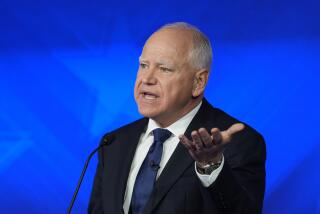Angry Kissinger Denies Abandoning POWs in 1973 : Vietnam: If any Americans were held, Hanoi should be blamed for violating accord, he tells Senate panel.
- Share via
WASHINGTON — Angry and indignant, former Secretary of State Henry A. Kissinger on Tuesday labeled a “flat-out lie” suggestions that he or then-President Richard M. Nixon deliberately abandoned American prisoners in a scramble to withdraw U.S. troops from Vietnam in 1973.
If any Americans were held by Communist forces when the war ended, Kissinger added, the blame must be placed on “cold-hearted rulers in Hanoi” who violated the peace agreement and failed to account fully for scores of U.S. servicemen who were missing in action or captured.
“No Administration official knew that there were live Americans kept in Indochina,” Kissinger testified under oath. “American prisoners may have been kept in Vietnam by a treacherous enemy in violation of agreements and human decency. But no one was left there by the deliberate act or negligent omission of any American official.”
But he acknowledged that the U.S. government never received a satisfactory accounting from the North Vietnamese of all Americans listed as missing in action in the war.
His daylong testimony came a day after Melvin R. Laird and James R. Schlesinger, two former secretaries of defense under Nixon, told Senate investigators that they believed that some Americans remained in captivity--with U.S. government knowledge--in Indochina when Nixon announced in late March, 1973, that all American POWS were coming home.
Kissinger brushed off their statements, saying neither Schlesinger nor Laird raised the issue with him at the time of the secret peace negotiations that led to the withdrawal of U.S. military forces. To further make the case against any duplicity on the Administration’s part, Kissinger also noted that Nixon had acknowledged in his 1973 speech that some problems remained in getting Hanoi to account for all Americans listed as missing in action.
Despite the apparently conflicting testimony, Kissinger and the two former Cabinet officers agreed that the Nixon Administration weighed whether to resume bombing of North Vietnam in the spring of 1973 to force the Hanoi government to account more fully for the missing Americans and halt the infiltration of arms to South Vietnam.
Kissinger said he recommended military action in mid-March, 1973, because of violations of the accord, but Nixon rejected the idea.
As Kissinger’s former assistant at the peace talks, Winston Lord, told the Senate panel Monday: “The President in the end decided not to scuttle the (peace) agreement and resume the war over the MIA question. It was a very difficult decision. We did not have conclusive proof, although we had strongly suggestive intelligence that the (POW) lists were incomplete.”
Under steady questioning, Kissinger himself said: “My present gut feeling is that no prisoners were left behind in Vietnam, but that probably some prisoners were left behind in Laos; but I’m not dogmatic about this.”
The Defense Department still lists 2,666 men as unaccounted for since the war’s end. Of that total, however, only 135 are considered high-priority cases involving servicemen who were believed to have been captured but never released or declared dead.
Under the agreement negotiated by Kissinger, North Vietnam freed 591 American prisoners of war in early 1973 in the well-publicized Operation Homecoming.
Kissinger challenged the Senate Select Committee on POW-MIA Affairs, contending that he and other peace negotiators were “being pilloried by leaks from this inquiry without a shred of evidence” for allegedly neglecting American captives in their haste to end the war.
In his rare appearance at what became an adversarial Senate hearing, Kissinger argued that he had made the best possible agreement to withdraw U.S. forces from Vietnam in return for what he said at the time were “iron-clad assurances” that all American prisoners would be returned.
Sen. John Kerry (D-Mass.), chairman of the committee, rejected Kissinger’s criticism of the Senate inquiry. He said some questions about Americans who fought for their country in an unpopular war still remain unanswered two decades later. Kerry fought in Vietnam and later became a leading anti-war activist.
Navy Lt. Ronald Dodge, he told Kissinger, was forced to eject from his jet over Laos and radioed another pilot from the ground that he was in danger of capture. A photograph of Dodge, in the hands of enemy troops, was published in a French magazine in September, 1967, Kerry noted. “To this day we don’t know what happened to him, and that’s why we’re here,” he told Kissinger, winner of a Nobel Peace Prize.
But Kissinger remained adamant, declaring: “The turn that this investigation has taken, to concentrate on American failings rather than Vietnamese transgressions, pains me greatly.”
More to Read
Get the L.A. Times Politics newsletter
Deeply reported insights into legislation, politics and policy from Sacramento, Washington and beyond. In your inbox twice per week.
You may occasionally receive promotional content from the Los Angeles Times.









